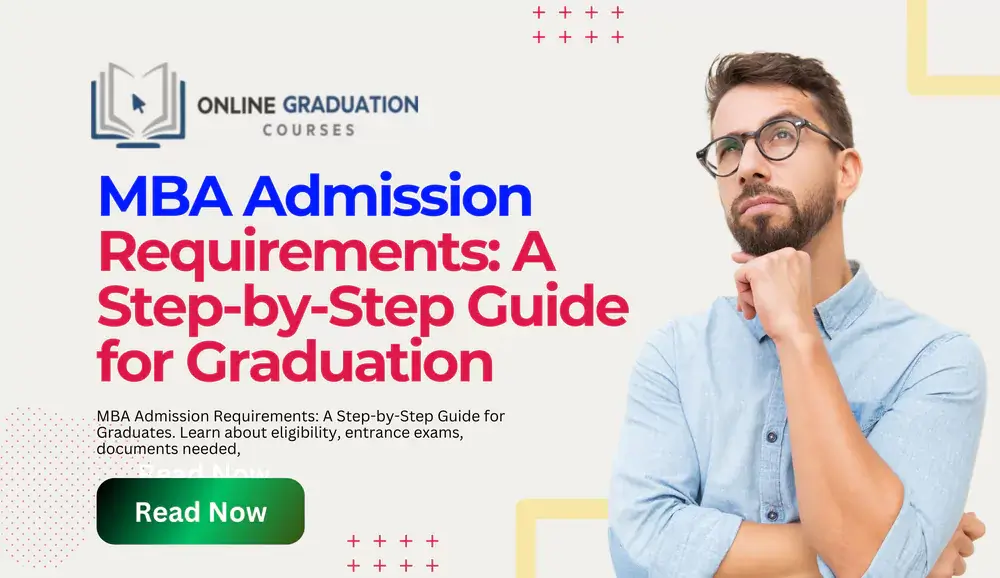Pursuing a Master of Business Administration (MBA) is a crucial step for individuals looking to advance their careers, develop leadership skills, and enhance their knowledge in business management. MBA programs are designed to equip students with strategic thinking, decision-making abilities, and problem-solving skills that are essential in the corporate world. Whether you are a fresh graduate or a working professional, understanding the MBA admission process is necessary to secure a seat in a reputed business school.
This detailed guide provides all the necessary steps to help you prepare for your MBA admission and achieve your academic and professional goals.
Table of Contents
Understanding MBA Eligibility Criteria
Before applying for a Graduation MBA program, it is essential to check the eligibility requirements set by universities and business schools. These typically include:
- A bachelor’s degree from a recognized university in any discipline.
- A minimum percentage or CGPA, which varies by institution (usually 50% or above).
- Some universities require work experience, particularly for Executive MBA programs.
- Entrance exam scores such as CAT, GMAT, XAT, MAT, CMAT, or NMAT are based on the institution’s requirements.
- Proficiency in the English language, often verified through exams like TOEFL or IELTS for international applicants.
Choosing the Right MBA Program
With multiple MBA programs available, selecting the right one depends on your career objectives, time commitment, and budget. The major types of MBA programs include:
An MBA (Master of Business Administration) is one of the most sought-after degrees for individuals looking to advance their careers in the business world. However, not all MBA programs are the same. Different formats are designed to cater to various needs, backgrounds, and career aspirations. Below, we explore the different types of MBA programs available, their benefits, and who they are best suited for.
#1. Full-Time MBA
Duration: 2 years (some universities offer accelerated 1-year programs)
Ideal for: Recent graduates and professionals looking for a career change or advancement
A full-time MBA is the most traditional and comprehensive form of MBA education. It is designed for students who can dedicate themselves fully to their studies without working simultaneously. This program includes intensive coursework, internships, networking opportunities, and leadership training.
Key Features:
- In-depth business education with practical learning experiences
- Internship opportunities with reputed companies
- Strong networking with peers, faculty, and industry leaders
- Specialization options in various fields like Marketing, Finance, HR, and more
#2. Part-Time MBA
Duration: 3-5 years (depending on the university and the student’s pace)
Ideal for: Working professionals who want to earn an MBA while maintaining their jobs
A part-time MBA allows students to continue working while pursuing their degree. Classes are often held in the evenings or on weekends to accommodate work schedules. This program is ideal for individuals who want to gain business knowledge without leaving their current job.
Key Features:
- Flexible learning schedule
- Practical application of knowledge in real-time at work
- Lower financial burden as students can continue earning while studying
- Can take longer to complete compared to a full-time MBA
#3. Executive MBA (EMBA)
Duration: 1-2 years
Ideal for: Senior professionals, managers, and executives with significant work experience
An Executive MBA is designed for professionals who already have managerial or leadership experience. The program focuses on strategic decision-making, leadership, and advanced management concepts. Unlike a traditional MBA, an EMBA emphasizes experience-based learning rather than foundational business principles.
Key Features:
- Intensive curriculum tailored for executives
- Courses focused on leadership, strategic management, and organizational growth
- Classes are usually held on weekends or in short intensive modules
- Strong networking opportunities with high-level professionals and industry leaders
#4. Online MBA
Duration: 1-3 years (varies based on the university and study pace)
Ideal for: Individuals who need flexibility in learning due to work, family, or location constraints
An Online MBA is a flexible and convenient option for students who want to earn a degree without attending physical classes. It allows learners to study from anywhere in the world and complete coursework at their own pace.
Key Features:
- Fully remote learning with digital access to study materials
- Interactive virtual classrooms and online networking opportunities
- Flexibility to balance studies with personal and professional commitments
- Some programs may require occasional campus visits for workshops or networking events
#5. Specialized MBA
Duration: 1-2 years
Ideal for: Individuals who want to focus on a specific industry or sector
A Specialized MBA is designed for those who wish to gain expertise in a particular field rather than a general business education. These programs offer specialized coursework tailored to industry-specific needs.
Popular Specializations:
- Finance: Focuses on investment banking, risk management, and corporate finance.
- Marketing: Covers digital marketing, brand management, and consumer behavior.
- Human Resources (HR): Prepares students for roles in recruitment, employee relations, and organizational behavior.
- Healthcare Management: Designed for professionals in the healthcare industry to understand hospital administration and health economics.
- Information Technology (IT): Emphasizes technology management, data analytics, and cybersecurity.
Key Features:
- Industry-focused curriculum with relevant case studies
- Specialized skills that enhance job prospects in a chosen sector
- Often includes internships or industry projects to gain practical experience
Which MBA is Right for You?
Choosing the right MBA program depends on several factors, including your career goals, current job status, financial situation, and time availability. Here’s a quick comparison:
| MBA Type | Duration | Best For | Key Benefits |
| Full-Time MBA | 2 years | Recent graduates, career changers | Comprehensive learning, networking, internships |
| Part-Time MBA | 3-5 years | Working professionals | Balance work and study, apply knowledge in real-time |
| Executive MBA | 1-2 years | Senior managers, executives | Leadership focus, networking, strategic decision-making |
| Online MBA | 1-3 years | Busy professionals, remote learners | Flexible learning, global networking, affordability |
| Specialized MBA | 1-2 years | Industry-specific professionals | Focused expertise, better job prospects in the chosen field |
Preparing for MBA Entrance Exams
Most top-ranked business schools require applicants to take an entrance exam. Here’s what you need to do:
- Identify the right exam: Depending on your target universities, choose from CAT, GMAT, XAT, MAT, CMAT, NMAT, or GRE.
- Understand the exam structure: Most MBA entrance exams test your knowledge in quantitative aptitude, logical reasoning, verbal ability, and data interpretation.
- Prepare with study materials: Refer to books, online resources, coaching institutes, and mock test series to enhance your performance.
- Develop a study plan: Dedicate a few months to rigorous preparation, focusing on time management and accuracy in problem-solving.
Performing well in the entrance exam significantly increases your chances of securing admission to top business schools.
Application Process & Required Documents
Once you have your entrance exam score, you need to apply to MBA programs. The application process involves submitting the following essential documents:
- Academic transcripts from 10th, 12th, and undergraduate studies.
- Entrance exam scorecard for CAT, GMAT, XAT, or any other relevant test.
- Statement of Purpose (SOP) explaining your motivation for pursuing an MBA and outlining your career goals.
- Letters of Recommendation (LORs) from professors, mentors, or employers who can vouch for your capabilities.
- Updated resume highlighting your educational background, work experience, and extracurricular achievements.
Submitting a well-prepared application increases your chances of getting shortlisted for further rounds of the admission process.
Cracking the Personal Interview & Group Discussion
After applying, shortlisted candidates are invited for further evaluation through Personal Interviews (PI) and Group Discussions (GD). Here’s how to prepare:
- Personal Interview Tips: Be confident, articulate your thoughts clearly, and prepare for common questions such as:
- “Why do you want to pursue an MBA?”
- “What are your strengths and weaknesses?”
- “How will an MBA help you achieve your career goals?”
- Group Discussion Strategies: Stay informed about current affairs, practice effective communication, and develop strong analytical reasoning skills.
- Case Study Discussions: Some institutes conduct case studies where candidates analyze business problems and present solutions.
Performing well in these rounds demonstrates your ability to think critically, communicate effectively, and handle pressure.
Understanding MBA Fees & Financial Aid Options
MBA programs can be expensive, but there are various financial aid options available:
- Tuition Fees: Varies based on the institution. In India, fees can range from INR 2 to 25 lakhs, while international MBA fees can go up to USD 100,000.
- Scholarships: Many universities offer merit-based and need-based scholarships that can help reduce the financial burden.
- Education Loans: Banks and financial institutions provide student loans with flexible repayment options.
- Company Sponsorships: Some employers sponsor their employees’ MBA programs in return for a work commitment post-completion.
Understanding these financial aspects helps in making an informed decision about pursuing an MBA.
Finalizing Admission & Enrollment Process
Once you receive an admission offer, the final steps include:
- Accepting the offer: Confirm your seat by paying the admission fee within the stipulated deadline.
- Document submission: Ensure all necessary documents, including identity proof and academic certificates, are submitted.
- Orientation program: Attend the introductory sessions to understand the curriculum, faculty, and campus facilities.
- Planning your MBA journey: Start preparing for the coursework, networking opportunities, and internships to maximize your learning experience.
Conclusion
Pursuing an MBA is a life-changing decision that opens doors to numerous career opportunities. From selecting the right program and preparing for entrance exams to cracking interviews and securing financial aid, each step plays a vital role in the admission process. With proper planning, dedication, and the right guidance, you can successfully navigate the MBA admission process and take a significant step toward building a promising career in business management. Start your MBA journey today and achieve your professional aspirations!

